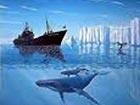| Videos | ? Latest |
|
? Feature | ? Sports | ? Your Videos |
Sea Shepherd to intercept whaling fleet in Japan

The fleet of an anti-whaling group, Sea Shepherd, has sailed out of Hobart, Australia. It is now on its latest mission to stop Japanese whaling activities in Antarctic waters.

Two of the group's ships the "Steve Irwin" and the "Bob Barker" set off from the Tasmanian capital.
They are bound for the Southern Ocean, trying to block the Japanese whaling fleet from firing harpoons and dangling ropes in the water.
The shepherds say, if they can't load whales, they can't kill whales.
Captain Paul Watson, Sea Shepherd, said, "Last year, we were able to stop them for 42 solid days by doing that. So, the quicker we get on to them, the more effective it will become."
Another violent series of confrontations is probably on the way.
In recent years the whalers have fired water cannons and sonar devices to disorient the activists.
Despite repeated mediation from the governments of Australia and New Zealand, the Sea Shepherd society say they are preparing for the same risks.
Captain Paul Watson, Sea Shepherd, said, "It's a very difficult situation for us. We're going down there making sure we don't injure anybody. But some of them are trying to kill us. So, it's a very one-sided thing. I think we saw that very clearly last year when they cut one of the boats in half and almost killed six of our people."
According to local media, Japan's six-vessel whaling fleet is expected to leave for Antarctic waters on Friday.
It is claimed to be Japan's scientific whaling programme. But the whale meat not used for study is sold for consumption in Japan.
Critics argue this is the real reason for the hunts.
 0
0 






